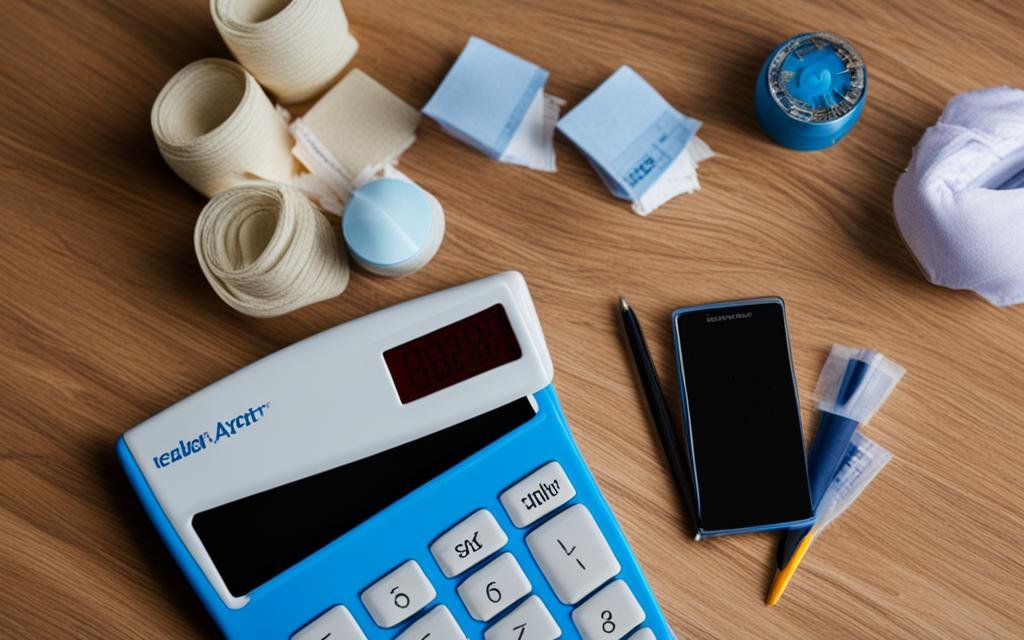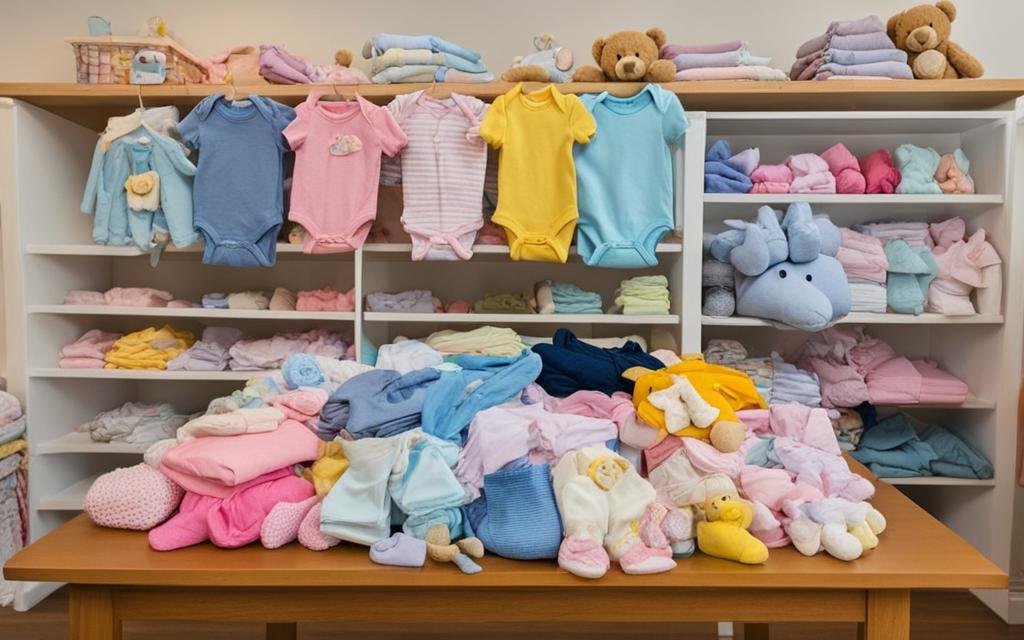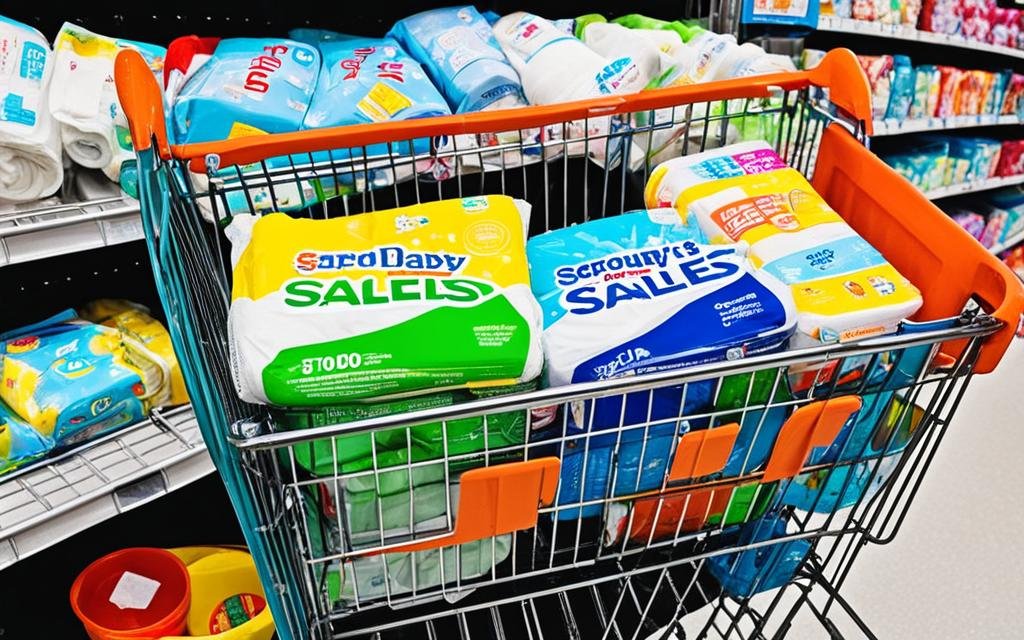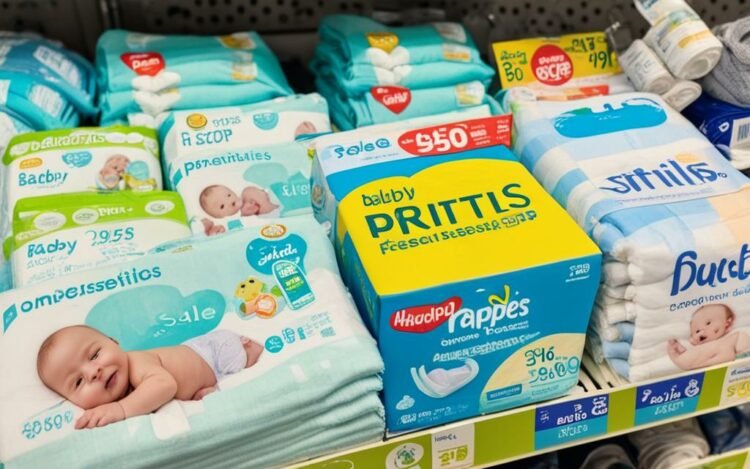Welcoming a new baby into the family is an exciting life event, but it can also bring financial concerns. Many parents struggle to balance providing the best for their little one while managing a tight budget. Luckily, there are ways to save on baby essentials without compromising quality. This article aims to provide money-saving tips and insights for budget-friendly parenting.
Key Takeaways:
- Affordable baby products can be found by researching and comparing prices.
- Consider purchasing discounted baby gear and cheap baby supplies to save money.
- Economical baby essentials can be a viable option without sacrificing quality.
- Prioritize needs over wants and create a budget plan specifically for baby-related expenses.
- Safely sourcing second-hand items and accepting hand-me-downs can offer substantial savings.
Prioritize and Plan: Setting Financial Goals
When preparing for the arrival of your little one, it’s crucial to establish clear financial goals to effectively manage baby-related expenses. By differentiating between needs and wants and prioritizing essential items, you can create a budget plan specifically tailored for your baby’s needs. This ensures that you allocate your funds wisely and avoid overspending, allowing you to provide for your baby without compromising your financial stability.
Start by evaluating your financial priorities and determining what is necessary for your baby’s well-being. Consider the essential items such as diapers, clothing, and feeding supplies that your baby will require on a daily basis. These are the foundation of your budget plan and should be prioritized accordingly.
Once you’ve identified your baby’s needs, it’s time to evaluate wants. While it’s natural to want the best for your little one, it’s important to weigh the cost and value of certain items. Determine which wants align with your budget and choose wisely. Remember, your baby’s happiness and development are not solely dependent on expensive products.
To create an effective budget plan, start by estimating the cost of necessary baby-related expenses monthly or annually. This serves as a baseline for understanding the financial commitment you will be making. Consider factors such as healthcare, childcare, diapers, clothing, and other recurring expenses. Set realistic spending limits for each category to ensure you allocate your funds appropriately.
With a budget plan in place, you can navigate the world of baby-related expenses with confidence. It’s important to review and adjust your budget periodically as your baby’s needs evolve. By staying organized and disciplined, you can provide for your little one while maintaining financial stability.
Remember, setting financial goals is essential for managing baby-related expenses effectively. By prioritizing needs over wants and creating a budget plan, you can confidently navigate the world of baby essentials without straining your finances. Now that you have a solid foundation in financial planning, it’s time to research and make informed purchasing decisions.
Financial Priorities
- Identify essential baby items
- Differentiate between needs and wants
- Create a budget plan
- Allocate funds effectively

Research and Reviews: Making Informed Purchasing Decisions
When it comes to buying baby essentials, it’s important to be well-informed before making any significant purchases. Doing thorough product research and reading reviews from experienced parents can help you make informed decisions and ensure that you get the best value for your money.
You can start by exploring various online platforms that provide detailed product information, specifications, and customer reviews. Pay attention to reviews that mention the product’s safety standards, durability, and overall quality. These insights from other parents who have used the products can give you a better understanding of their long-term value.
Comparison shopping is another valuable strategy for finding the best deals on baby essentials. Take the time to compare prices and features across different retailers to ensure you’re getting the most bang for your buck. Don’t overlook the option of considering older models as they often offer the same level of functionality and safety at a lower cost.

Why Product Research Matters
Product research helps you understand the safety standards and quality of the baby items you intend to purchase. By reading reviews and doing your due diligence, you can avoid products that may not meet your expectations or pose any safety risks.
Value for Money
By investing time in researching and comparing products, you can find options that provide the best value for your money. Look for well-built and durable items that can grow with your baby to avoid unnecessary replacement costs in the future.
Ensuring Safety
Safety is paramount when it comes to baby items. By reading reviews and being aware of safety standards, you can make sure that the products you choose meet the necessary requirements to keep your baby safe and secure.
- Research baby products online.
- Read reviews from other parents.
- Compare prices and features.
- Consider older models for cost savings.
By following these steps and being an informed shopper, you can make wise purchasing decisions that meet both your budget and your baby’s needs.
Embrace Second-hand and Hand-me-downs: Saving Money Safely
Safely sourcing second-hand items can offer substantial savings on essentials like clothing, toys, and books. When it comes to budget-friendly parenting, every penny counts. However, it’s important to exercise caution and make informed decisions when purchasing second-hand items, especially those where safety standards matter, such as car seats and cribs.
Engaging with local parenting groups can be a valuable resource for finding well-maintained second-hand items. These groups often organize community sales or swap events where parents can buy or exchange baby items at affordable prices. Not only does this provide wallet-friendly options, but it also creates a sense of community and connection among families.
Accepting hand-me-downs from relatives and friends is another way to save money while ensuring the safety of the items. Trusted individuals who have previously used the baby essentials can serve as a reliable source for quality products that meet safety standards. By accepting these items, you not only save money, but you also establish a network of support and shared experiences.
Remember, safety is paramount when it comes to your baby’s well-being. For certain items like car seats and cribs, it’s crucial to confirm that they meet the current safety standards and have not expired. Always inspect second-hand items thoroughly for any signs of wear, damage, or recalls. Prioritizing your baby’s safety while embracing second-hand and hand-me-downs is an effective way to create a financially sound parenting strategy.
As the saying goes, “one person’s trash is another person’s treasure.” By embracing second-hand and hand-me-downs and being mindful of safety standards, you can find high-quality baby items at a fraction of the cost, leaving you with more resources for other important aspects of parenting.

Benefits of Embracing Second-hand and Hand-me-downs:
- Substantial savings on essential baby items
- Opportunity to connect with local parenting communities
- Establishing a sense of community and support
- Access to well-maintained products at affordable prices
- More financial flexibility for other parenting needs
Smart Shopping Strategies: Bulk Buying and Sales
When it comes to recurring baby essentials like diapers and wipes, planning ahead can save you both time and money. One cost-effective strategy is to buy these items in bulk. Purchasing larger quantities at once not only ensures that you won’t run out of essential supplies, but it also allows you to take advantage of bulk-buying discounts, which often offer substantial savings.
Another savvy shopping technique to consider is keeping an eye out for sales and clearance events. Many retailers offer seasonal or annual sales where baby products are discounted. By marking your calendar and planning your purchases around these events, you can score fantastic deals on everything from clothing to nursery furniture, all while sticking to your budget.
In addition to sales, loyalty programs and memberships are a great way to access exclusive discounts and promotions. Many retailers offer loyalty programs where members receive regular discounts or earn points that can be redeemed for future purchases. By joining these programs, you can enjoy economical prices on your baby essentials while enjoying the perks of being a valued customer.
To give you an idea of how much you can save, here is a breakdown of potential savings:
- Diapers: Bulk buying can result in savings of up to 30% or more compared to buying individual packs.
- Wipes: Buying wipes in bulk can save you up to 20% or more.
- Baby clothing: Taking advantage of sales and clearance events can lead to savings of up to 50% or more.
- Nursery furniture: Keep an eye out for clearance events, where you can find discounts of up to 70% on cribs, changing tables, and more.
By implementing these smart shopping strategies, you can provide for your baby’s needs without breaking the bank. Remember, saving money doesn’t mean compromising on quality. With careful planning and a little research, you can find economical prices on top-quality baby essentials, ensuring both your budget and your little one are well taken care of.

DIY Approach: Homemade and Personalized Savings
If you’re looking for a cost-effective strategy, embracing a DIY approach can be a game-changer. By incorporating homemade baby food and DIY toys, you can not only save money but also add a personalized touch to your baby’s life.
Making Homemade Baby Food
One of the easiest ways to cut down on expenses while ensuring your baby gets nutritious meals is by making homemade baby food. By preparing meals at home, you have control over the ingredients, ensuring that your baby receives wholesome, organic options. Plus, it’s often more affordable than purchasing prepackaged baby food at the store. You can batch cook and freeze portions for convenience and cost-effectiveness.
Creating DIY Toys
Entertaining your baby doesn’t have to break the bank. Get creative by crafting DIY toys from household items. Transform cardboard boxes into imaginative play spaces, repurpose old containers as sensory toys, or create hand-made stuffed animals with fabric scraps. Not only is this a budget-friendly option, but it also allows you to infuse your personalized touch into your baby’s playtime.
With a little creativity, you can provide engaging and stimulating toys without spending a fortune. DIY toys can help develop your baby’s motor skills, cognitive abilities, and imagination.
Remember, while you strive to be cost-effective, safety should always be a priority. Ensure that the materials and toys you use are suitable for your baby’s age, free from potential hazards, and regularly inspect them for any signs of wear and tear.
By incorporating homemade baby food and DIY toys into your parenting routine, you’ll not only save money but also provide your baby with a personalized and entertaining experience. Get started with your DIY adventures, and watch your little one thrive!
Plan for the Future: Saving Early and Investing Smart
As a parent, it’s crucial to plan for the future and ensure financial stability for your child’s needs. By starting early and implementing proactive financial planning, you can build a dedicated savings fund to support their educational needs and other expenses. Here are some strategies to consider:
- Establish a Dedicated Savings Fund: Begin by setting up a dedicated savings account specifically for your child’s future expenses. This fund will help you stay organized and separate your baby-related savings from other financial commitments.
- Practice Proactive Financial Planning: Take a proactive approach to financial planning by creating a budget and regularly reviewing your expenses. Identifying areas where you can cut back or save will free up additional funds to contribute towards your child’s future.
- Explore Long-Term Investments: Consider investing a portion of your savings in long-term investment options with the goal of generating significant returns over time. Speak to a financial advisor to discuss investment opportunities such as stocks, bonds, or mutual funds that align with your risk tolerance and long-term goals.
- Prioritize Educational Needs: Education is a significant expense for any family, so it’s important to plan ahead. Research different education savings plans, such as 529 plans or education savings accounts, to ensure you have the necessary funds for your child’s future academic endeavors.
By prioritizing your child’s future and implementing smart financial strategies, you can provide them with the best possible opportunities. Remember, the key is to start early, be consistent, and make informed decisions that align with your long-term goals.
Conclusion
Welcoming a baby into your family is an incredible experience that brings joy and love. However, it can also come with financial stress. Fortunately, with the right approach, you can navigate the world of budget-friendly parenting and save on baby essentials without compromising on quality.
Through practical tips and smart strategies, you can alleviate the financial burden and create a more cost-effective parenting journey. Prioritizing your needs, setting clear financial goals, and creating a budget plan specifically for baby-related expenses are essential steps in managing your finances. Researching products, reading reviews, and comparison shopping will help you make informed purchasing decisions and find the best value for your money.
Additionally, consider embracing second-hand items and hand-me-downs from trusted sources, as they can significantly reduce costs without sacrificing safety. Take advantage of smart shopping strategies, such as buying in bulk or during sales, and explore loyalty programs for additional savings. Incorporating a DIY approach by making homemade baby food and creating personalized toys adds a cost-effective touch to your parenting journey.
Lastly, it’s crucial to plan for the future by starting early and investing smartly. Establish a dedicated savings fund for your child’s expenses and proactively plan for long-term investments, including their educational needs. By following these practical tips and strategies, you can provide the best for your little one while alleviating financial stress and enjoying the beautiful journey of parenthood.
FAQ
How can I save money on baby essentials?
There are several ways to save on baby essentials. You can start by creating a budget plan, differentiating between needs and wants and prioritizing essential items. Thorough research and reading reviews can help you find the best deals, and buying second-hand items can offer substantial savings. Shopping during sales and buying in bulk can also be cost-effective. Additionally, taking a DIY approach and creating homemade baby food and toys can save you money. Finally, setting up a dedicated savings fund and investing smartly can help you plan for the future.
How do I prioritize and plan for baby-related expenses?
Prioritizing and planning for baby-related expenses involves setting clear financial goals, differentiating between needs and wants, and creating a budget plan specifically for baby-related expenses. By identifying essential items and allocating funds effectively, you can avoid overspending and manage your finances better.
How can I make informed purchasing decisions for baby essentials?
Making informed purchasing decisions for baby essentials requires thorough research and reading reviews from other parents. This ensures value for money and highlights safety and durability concerns. Comparison shopping can help you find the best deals, and considering older models can often serve just as effectively as newer ones at a lower cost.
Is buying second-hand baby items safe and cost-effective?
Buying second-hand baby items can be both safe and cost-effective. It is important to be cautious with items where safety standards matter, such as car seats and cribs. However, sourcing second-hand items like clothing, toys, and books from trusted sources or engaging with local parenting groups can offer substantial savings and foster a sense of community.
How can I save money through smart shopping strategies?
You can save money through smart shopping strategies by buying baby essentials in bulk or during sales. Many retail establishments offer loyalty programs or memberships that provide regular discounts. Marking your calendar for annual sales or clearance events can also help you find economical prices without compromising on quality.
Are homemade baby food and DIY toys a cost-effective approach?
Yes, taking a DIY approach can be a cost-effective strategy. Making homemade baby food ensures healthier meals and is more economical than store-bought alternatives. Creating toys from household items or using handmade playthings can be a fun and wallet-friendly way to entertain your baby.
How can I plan for the future financially as a parent?
Planning for the future financially involves starting to save early and establishing a dedicated savings fund for baby-related expenses. Proactive financial planning provides a cushion for unforeseen expenses and prepares for future needs like education. Investing in long-term savings plans or bonds tailored for your child’s future can also ensure a solid financial foundation.
Any closing thoughts on budget-friendly parenting?
Welcoming a baby is a beautiful journey, and by implementing money-saving tips and strategies, parents can navigate the financial aspects of raising a child without unnecessary stress. With proper planning, research, and creativity, it is entirely possible to provide the best for your little one without straining your wallet.

